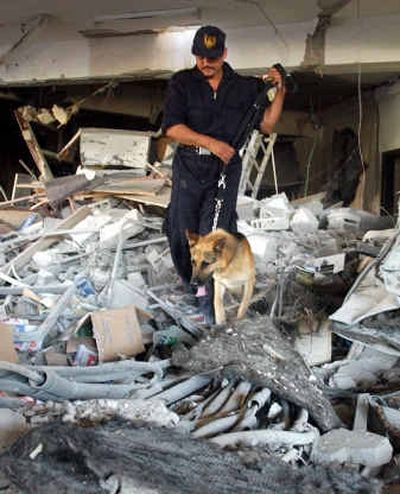Bombings point to al Qaeda

CAIRO, Egypt – Rescuers dug through the rubble of a luxury hotel on Egypt’s Sinai Peninsula on Friday, as Israeli officials said Thursday’s coordinated car bombings at resorts full of Israeli tourists bore the hallmarks of al Qaeda.
Three previously unknown groups made public claims of responsibility on the Web and to media outlets following the blasts, but they gave none of the details that militants usually provide to substantiate their claims.
Israel’s military intelligence chief, Maj. Gen. Aharon Zeevi-Farkash, told an emergency Cabinet meeting Friday that al Qaeda was most likely behind the attacks. Though he cautioned that very little was known about the perpetrators, Deputy Defense Minister Zeev Boim also said Osama bin Laden’s extremist network was the most likely suspect.
Egyptian officials said the attacks must be blamed in part on disorder in Iraq and bloodshed in the Israeli-Palestinian conflict, which help recruit willing young militants to extremist causes.
“What happens in Iraq, a meaningless war there, and what happens in Palestine, with no sign of a Palestinian state, gives the generals of terrorism all the soldiers they need,” said government spokesman Taha Abdel Aleem.
Egypt is a particularly symbolic target for Islamic extremists because President Bush calls the country a leading candidate for the sort of democratization that the war in Iraq was designed to accomplish. Reviewing his “forward strategy of freedom” to promote democracy in the Middle East in a speech to the National Endowment for Democracy last November, Bush singled out Egypt and called upon it to “show the way toward democracy” in the region.
Instead, Egyptian officials and political analysts said that this week’s attacks would likely postpone reform while the country turned attention to security.
“To go ahead for the reform, we need the climate to do so,” said Abdel Aleem, the spokesman.
Civil liberties groups have long accused Egypt and other Arab governments of invoking security concerns as a pretext for stifling dissent and short-circuiting legal protections. Last month Egyptian President Hosni Mubarak declined to scrap emergency laws introduced in 1981, after the assassination of President Anwar Sadat.
Following the latest attacks, Israeli Prime Minister Ariel Sharon and Mubarak spoke by phone, Sharon’s office said, and renewed their pledge to cooperate in stamping out terrorism.
Egyptian and Israeli investigators on Friday scoured the scenes of the attacks on the Hilton hotel in Taba and two campgrounds farther down the Red Sea coast in the area known as Ras al-Shaitan. The bombings hit during peak tourist season, at the end of a Jewish holiday, when thousands of Israeli vacationers were in the Sinai to dive among coral reefs and gamble in casinos.
The first and deadliest car bomb Thursday flattened the lobby of the Taba Hilton hotel and sheered off a 10-story column of rooms. Israel Radio said Friday that officials suspected there was also a suicide bomber in the rear of the Hilton, near a swimming pool, who could have contributed to the building collapse and fire. Roughly an hour after the hotel bombing, two car-bombings struck the Ras al-Shaitan area, killing two Israelis and an Egyptian.
Israeli rescuers revised the death toll Friday to at least 29, down from an initial report of 35. The dead included 24 Israelis and five Egyptians, with an unknown number of other victims still believed to be trapped beneath the rubble. In a separate tally, the Egyptian Interior Ministry said 22 died, but provided no explanation for the disparity. More than 100 others were wounded.
In the Gaza Strip, Palestinian militant faction Hamas announced that it had no ties to the attacks – analysts and officials had said the group would be an unlikely source for the attacks. Palestinian groups have relied on Egypt as an intermediary in negotiations with Israel, and Egypt plays a potentially key role in mediating Israel’s planned withdrawal from the Gaza Strip next year.